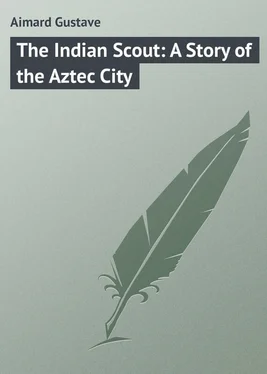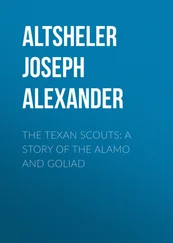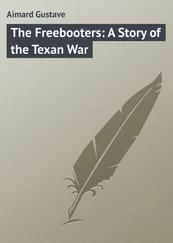Gustave Aimard - The Indian Scout - A Story of the Aztec City
Здесь есть возможность читать онлайн «Gustave Aimard - The Indian Scout - A Story of the Aztec City» — ознакомительный отрывок электронной книги совершенно бесплатно, а после прочтения отрывка купить полную версию. В некоторых случаях можно слушать аудио, скачать через торрент в формате fb2 и присутствует краткое содержание. Жанр: foreign_prose, на английском языке. Описание произведения, (предисловие) а так же отзывы посетителей доступны на портале библиотеки ЛибКат.
- Название:The Indian Scout: A Story of the Aztec City
- Автор:
- Жанр:
- Год:неизвестен
- ISBN:нет данных
- Рейтинг книги:4 / 5. Голосов: 1
-
Избранное:Добавить в избранное
- Отзывы:
-
Ваша оценка:
- 80
- 1
- 2
- 3
- 4
- 5
The Indian Scout: A Story of the Aztec City: краткое содержание, описание и аннотация
Предлагаем к чтению аннотацию, описание, краткое содержание или предисловие (зависит от того, что написал сам автор книги «The Indian Scout: A Story of the Aztec City»). Если вы не нашли необходимую информацию о книге — напишите в комментариях, мы постараемся отыскать её.
The Indian Scout: A Story of the Aztec City — читать онлайн ознакомительный отрывок
Ниже представлен текст книги, разбитый по страницам. Система сохранения места последней прочитанной страницы, позволяет с удобством читать онлайн бесплатно книгу «The Indian Scout: A Story of the Aztec City», без необходимости каждый раз заново искать на чём Вы остановились. Поставьте закладку, и сможете в любой момент перейти на страницу, на которой закончили чтение.
Интервал:
Закладка:
"By what accident did I meet you here, Brighteye?" his friend asked, hastily interrupting him.
Marksman knew that so soon as Brighteye began a story, no power on earth would stop him. The worthy man, during the course of a long and varied career, had seen and done so many extraordinary things, that the slightest event which occurred to him, or of which he was merely a witness, immediately became an excuse for one of his interminable stories. His friends, who knew his weakness, felt no hesitation about interrupting him; still we must do Brighteye the justice of saying that he was never angry with his disturbers; for ten minutes later he would begin another story, which they as mercilessly interrupted in a similar way.
To Marksman's question, he replied, – "We will talk, and I will tell you that." Then, turning to Domingo, he said, – "My friend, I thank you for the assistance you have given us. Return to the camp, and do not forget your promise. Above all, do not omit to narrate all you have seen, to – you know who!"
"That is agreed, old hunter. Don't be uneasy. Good-bye."
"Here's luck."
Domingo threw his rifle over his shoulder, lit his pipe, and walked in the direction of the camp, where he arrived an hour later.
"There," Marksman said, "now I believe nothing will prevent your going ahead."
"Yes; one thing, my friend."
"What is it?"
"The night is nearly spent; it has been fatiguing to everybody. I presume that two or three hours' sleep are necessary, if not indispensable, especially as we are in no hurry."
"Tell me only one thing first, and then I will let you sleep as long as you please."
"What is it?"
"How you happened so fortunately to come to my aid."
"Confound it! That is exactly what I was afraid of. Your question obliges me to enter into details far too long for me to be able to satisfy you at this moment."
"The truth is, my friend, that, in spite of the lively desire I feel to spend a few days with you, I am compelled to leave you at sunrise."
"Nonsense! It is not possible."
"It is, indeed."
"But what is your hurry?"
"I have engaged myself as scout with a caravan, which I have given the meeting at two o'clock tomorrow afternoon, at the Del Rubio ford. That appointment has been made for the last two months. You know that an engagement is sacred with us hunters, and you would not like to make me break my word!"
"Not for the hides of all the buffalos killed every year on the prairie. Towards what part of the Far West will you guide these men?"
"I shall know that tomorrow."
"And with what sort of people have you to do? Are they Spaniards, or Gringos?"
"On my word, I fancy they are Mexicans. Their chief’s name, I think, is Don Miguel Ortega, or something like it."
"Hallo!" Brighteye exclaimed, with a start of surprise; "what's that you said?"
"Don Miguel Ortega. I may be mistaken, but I hardly think so."
"That is strange," the old hunter said, as if speaking to himself.
"I do not see anything strange in it; the name appears to me common enough."
"To you, possibly. And you have made an agreement with him?"
"Signed and sealed."
"As scout?"
"Yes, I say, a thousand times."
"Well, comfort yourself, Marksman; we have many a long day to spend together."
"Do you belong to his party?"
"Heaven forbid!"
"Then, I don't understand anything."
Brighteye seemed to be reflecting seriously for a few moments; then he turned to his friend, and said, —
"Listen to me, Marksman! So surely as you are my oldest friend, I do not wish to see you going to the deuce your own road. I must give you certain information, which will be indispensable to you in doing your duty properly. I see that we shall not sleep this night, so listen to me attentively. What you are about to hear is worth the trouble."
Marksman, startled by the old hunter's solemn accent, looked at him anxiously. "Speak!" he said to him.
Brighteye collected his thoughts for a moment, and then took the word, beginning a long history, to which his audience listened with a degree of interest and attention which increased with every moment; for never, till that day, had they heard the narrative of events so strange and extraordinary.
The sun had risen for a long time, but the hunter was still talking.
CHAPTER VI
A DARK HISTORY
Freed from all the observations, more or less pertinent, with which it pleased the prolix hunter to embellish it, the following is the remarkable story the Canadian told his hearers. This narrative is so closely connected with our story, that we are compelled to repeat it in all its details: —
"Few cities offer a more enchanting appearance than Mexico. The ancient capital of the Aztecs lies stretched out, slothful and idle as a Creole maid, half veiled by the thick curtain of lofty willows which border at a distance the canals and roads. Built at exactly equal distance from two oceans, at about 7,500 feet above their level, or at the same height as the hospice of St. Bernard, this city, however, enjoys a delicious tempered climate, between two magnificent mountains – Popocatepetl, or the burning mountain, and Intaczehuatl, or the white woman – whose rugged peaks, covered with eternal snows, are lost in the clouds. The stranger who arrives before Mexico at sunset, by the eastern road – one of the four great ways that lead to the City of the Aztecs, and the only one now remaining isolated in the middle of the waters of Lake Tezcuco, on which it is built – experiences, at the first sight of this city, a strange emotion, for which he cannot account. The Moorish architecture of the edifices; the houses painted of bright colours; the numberless domes of churches and convents which rise above the azoteas, and cover – if we may use the expression – the entire capital with their vast yellow, blue, and red parasols, gilded by the parching rays of the declining sun; the warm and perfumed evening breeze which comes sporting through the leaf-laden branches; all this combines to give Mexico a perfectly Eastern air, which astonishes and seduces at the same time. Mexico, entirely burnt down by Fernando Cortez, was rebuilt by that conqueror after the original plan; all the streets intersect at right angles, and lead to the Plaza Mayor by five principal arteries."
"All Spanish towns in the New World have this in common – that, in all, the Plaza Mayor is built after the same plan. Thus, at Mexico, on one side are the Cathedral and the Sagrario; on the second, the Palace of the President of the Republic, containing the ministerial offices – four in number, barracks, a prison, &c.; on the third side is the Ayuntamiento; while the fourth is occupied by two bazaars – the Parián, and the Portal de los Flores."
"On July 10, 1854, at ten of the night, after a torrid heat, which compelled the inhabitants to shut themselves up in their houses the whole day through, the breeze rose and refreshed the air, and everybody, mounted on the flower-covered azoteas, which make them resemble hanging gardens, hastened to enjoy that serene placidity of American evenings, which seems to rain stars from the azure sky. The streets and square were thronged with promenaders; there was an inextricable throng of foot passengers, horsemen, men, women, Indians and their squaws, where the rags, silk and gold were arranged in the quaintest manner, in the midst of cries, jests, and merry bursts of laughter. In a word, Mexico, like the enchanted city of the Arabian Nights, seemed to have been aroused by the bell of Oración from a centennial sleep – such joy did all faces display, and so happy did all seem to inhale the fresh air."
"At this moment, a non-commissioned officer, who could be easily recognised as such by the vine stick he held in his hand, turned out of the Calle San Francisco, and mingled with the crowd that thronged the Plaza Mayor, giving himself all the airs peculiar to soldiers in all parts of the world. He was a young man, of elegant features, haughty glance, and his slight moustache was coquettishly turned up. After walking round the square two or three times, ogling maidens and elbowing the men, he approached, with the same careless air he had displayed from the beginning, a shop built against one of the portales, in which an old man with a ferret-face and cunning look was shutting up in the drawers of a poor table, stained with a countless number of ink spots, paper, pens, sand, and envelopes – in a word, all the articles requisite for the profession of a public writer – the trade which the little old man really carried on, as could be seen from a board hung over the door of his shop, on which was written, in white letters on a black ground, — Juan Battista Leporello, Evangelista . The sergeant looked for a few seconds through the panes, which were covered with specimens of calligraphy, and then, doubtless satisfied with what he saw, he tapped thrice with his stick on the door."
Читать дальшеИнтервал:
Закладка:
Похожие книги на «The Indian Scout: A Story of the Aztec City»
Представляем Вашему вниманию похожие книги на «The Indian Scout: A Story of the Aztec City» списком для выбора. Мы отобрали схожую по названию и смыслу литературу в надежде предоставить читателям больше вариантов отыскать новые, интересные, ещё непрочитанные произведения.
Обсуждение, отзывы о книге «The Indian Scout: A Story of the Aztec City» и просто собственные мнения читателей. Оставьте ваши комментарии, напишите, что Вы думаете о произведении, его смысле или главных героях. Укажите что конкретно понравилось, а что нет, и почему Вы так считаете.












